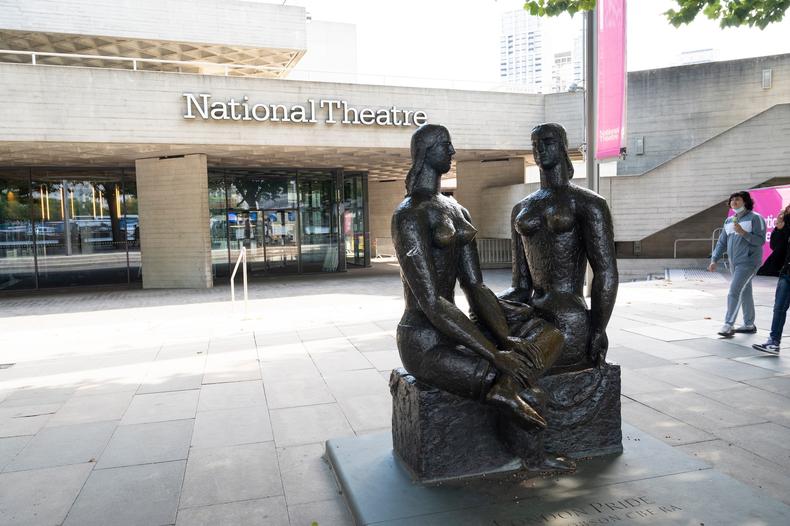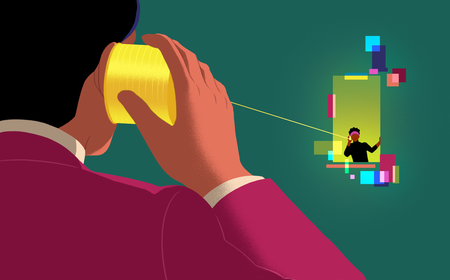
“The theater, the theater. What happened to the theater?” That debate is a beast in its own right, and just as hotly contested is how to even spell the word. You’ve likely seen it spelled two ways: “theater” and “theatre.” And you may have asked yourself: Aren’t they the same thing? Is there actually a difference? Does it matter? Read on for more.

Erhan Inga/Shutterstock
The difference between “theater” and “theatre” is part of the divide between American English and British English.
“Theater” (with the ER) is how it is spelled in the United States.
“Theatre” (with the RE) is how it is spelled in the United Kingdom.
Both spellings mean the same thing: a building, area, or structure used to stage a play or film, or the production itself presented within. Simple enough. So then why the two different spellings?
Much like acting itself, the word “theatre” has roots in ancient Greece through the verb “theasthai,” or “to behold,” and “theatron,” or “viewing place.” When Greek gave way to Latin, the word became “theatrum.” In the 14th century, the French were the first to adopt the word with the spelling “théâtre.”
For centuries, English speakers used either ending interchangeably; some of history’s most famous writers spelled it differently from one another. For example, Geoffrey Chaucer, author of the “The Canterbury Tales,” used “theatre.” Meanwhile, William Shakespeare spelled the word as “theater.” According to the Oxford English Dictionary, “from c1550 to 1700, or later, the prevalent spelling was theater,” but then “between 1720 and 1750, theater was dropped in Britain.”
Then, in the early 19th century, an American named Noah Webster decided it needed another change. While compiling “An American Dictionary of the English Language”—later known as the Merriam-Webster dictionary, which we still use today—Webster changed the spelling of many words to appear less British. According to Merriam-Webster, the influential lexicographer “resented that American classrooms were filled only with British textbooks,” and was also “motivated both by nationalist fervor and a desire to reform spelling.” In a sense, it was the next phase of the American Revolution: Webster wanted to create a more cohesive language for the young nation, and to continue our push toward total independence from Britain.
This is why, for example, some words in the U.S. do not have a “u” in them, whereas in the U.K. they do – such as “color” vs “colour.” And, of course, another change Webster initiated was taking words with an “re” ending and giving them the “er” ending. Thus, “theater” became the dominant spelling in the United States.

Sean Pavone/Shutterstock
In general, the difference really just depends on where you’re from. If you’re in the United States, you’re more likely to use “theater.” And if you’re in the United Kingdom (or former British colonies like Australia, Canada, or New Zealand), you’re going to use “theatre.”
However, a distinction you’ll occasionally see in America is using both: “theatre” to describe the venue, and “theater” to represent the art. For example, the Steppenwolf Theatre Company in Chicago or Ford’s Theatre in Washington D.C. is where you’d go to see a work of theater.
When it comes to spelling “theater” in reference to movies, the same rules apply. Americans will spell it “theater” while Brits spell it as “theatre.” However, “movie theater” is actually more of a North American phrase than a broad English one. When Brits talk of seeing a movie, they will often say that they are “catching a film,” or “going to the cinema.” Rarely do they say “going to a movie.”
Canadians, on the other hand, split the difference: they do use the phrase “going to the movie theatre,” but adopted the “re” spelling of the word.
So, there you have it. The only real difference between “theater” and “theatre” is location, location, location. Thankfully, no matter which spelling you see, it means the exact same thing.
 How To Break Into Musical Theater
How To Break Into Musical Theater 














